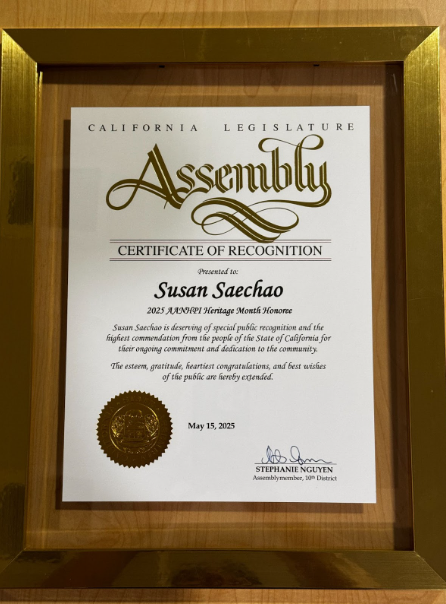Navigating Identity: A First-Generation Iu-Mien American Story
- Danae Hendrickson

- Oct 17, 2025
- 4 min read
From the desk of: Susan Saechao, Executive Director of Iu Mien Community Services
My name is Susan Saechao, and I am the current Executive Director of Iu-Mien Community Services (IMCS). My journey into this role is deeply personal, rooted in my family’s history as refugees from Laos and my own experience growing up navigating two worlds.
My family’s journey began long before I was born, in the mountains of Laos. Like many Iu-Mien families, my parents were forced to flee their homeland during the aftermath of the American Secret War. They left everything they knew behind: family, culture, language, and the sense of belonging that comes with home. Eventually, they resettled in the United States as refugees, hoping to build a safer life. Out of that sacrifice, I was born, the first generation in my family to call America home.

Growing up as a child of refugees was challenging. My parents carried trauma from war and displacement, while I carried the responsibility of trying to bridge my two identities. At home, I was immersed in Iu-Mien traditions and values. But outside, I quickly learned that assimilation was expected if I wanted to be accepted. I learned to speak English without an accent, concealing cultural differences, and adopting American norms as means of survival. Yet in doing so, I often felt disconnected from my roots because embracing them meant risking judgment, ridicule, or exclusion. I often felt the tension of trying to fit in while remaining true to myself.

My sense of identity was further complicated by growing up in an Iu-Mien Christian Church community. Church became a big part of my childhood. I joined the choir, participated at Sunday School, and volunteered regularly. But as I grew older, I began questioning the lessons and politics I saw in that space. The church emphasized modern interpretations of faith rather than traditional cultural practices, leaving me feeling even more adrift between two worlds.
Everything began to shift my senior year of high school when I enrolled in an ethnic studies class. For the first time, I learned about the histories, struggles, and resilience of different communities of color. That class opened my eyes to the beauty of cultural diversity and made me curious about my own heritage, which I had never fully embraced.
When I left my hometown of Merced to attend college in Sacramento, I experienced culture shock. In Merced, I had always been surrounded by Iu-Mien families. Our last name, Saechao, was so common that no one ever questioned my ethnicity. But in Sacramento, I realized many people had never even heard of the Mien people, or “Iu-Mien,” as it is more formally recognized today. That moment was painful, yet it clarified my sense of purpose. I knew then that it was my mission to educate others about who the Iu-Mien are, where we come from, and why we are here.
My brother, Ou Saechao, helped show me the way. As a student at UC Davis, he co-founded the Iu-Mien Student Association (IMSA), and I was honored when he invited me to join as a member. For the first time, I met other young people who shared my passion for celebrating and preserving our culture. Together, we organized Iu-Mien New Year celebrations, fundraisers, and cultural workshops. We cooked, danced, sang, and learned how to tell our people’s stories to the world. Being part of IMSA gave me confidence and purpose. I was no longer alone in my desire to reclaim and share my identity.

My commitment to the community led me to volunteer at The Center - Sacramento Chinese Community Services Center. There, I mentored at-risk youth from middle school through high school. One of my mentees was a bright young Iu-Mien girl whom I worked with for five years. Working with her allowed me to witness the importance of providing guidance that nurtures both self-confidence and a sense of connection. Being her mentor reminded me that representation matters; that our youth need to see role models who look like them, who have walked similar paths, and who believe in their potential. That experience deepened my responsibility to ensure that the next generation grows up proud of their heritage and connected to their roots.
Over the years, that sense of duty led me to where I am today: serving as the Executive Director of Iu-Mien Community Services. For more than 30 years, IMCS has been a cornerstone for the Iu-Mien community, offering everything from cultural preservation to youth programs and senior support. I am proud to be the first Iu-Mien woman to hold this position. In a community where leadership has traditionally been dominated by men, my role carries significance not just for myself, but for future generations of Iu-Mien women. It is proof that our voices, our leadership, and our contributions are vital to the future of our community.




